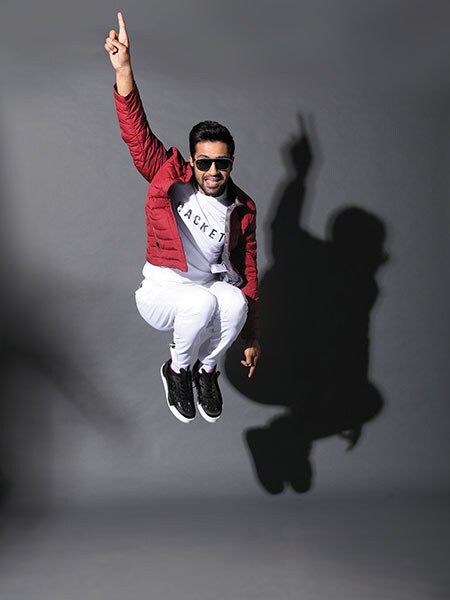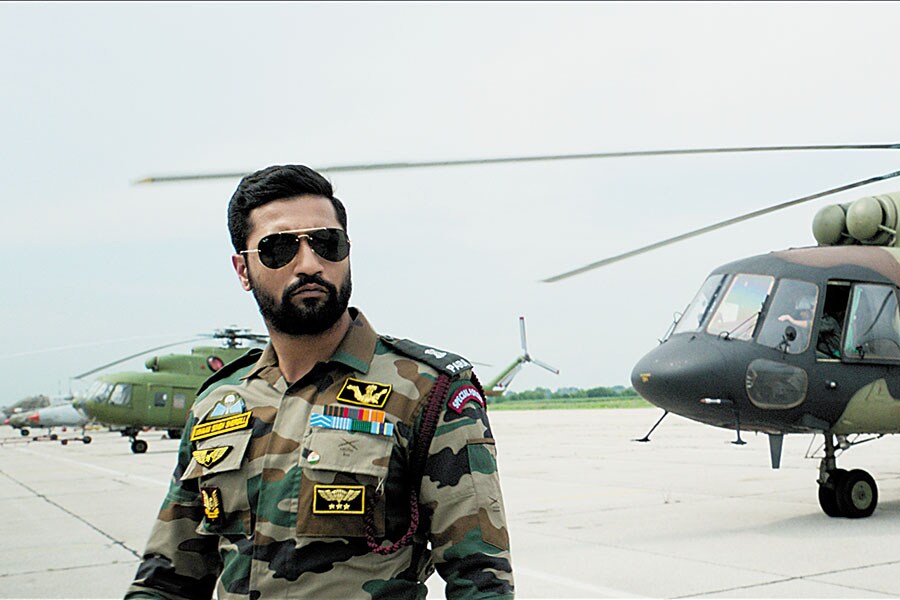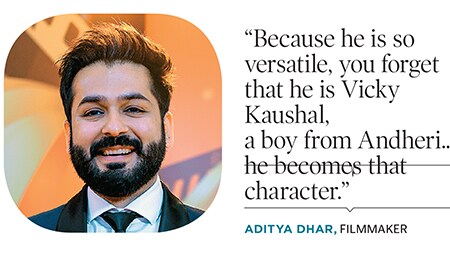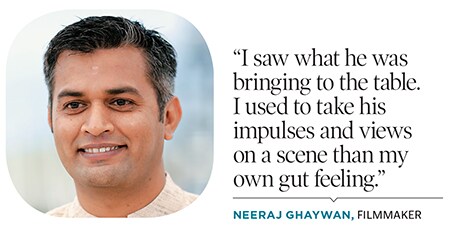Vicky Kaushal: The josh machine
With the success of Uri, Vicky Kaushal has firmly established what his early-day colleagues already knew about him—that he's star material


 Vicky Kaushal
Vicky Kaushal
Image: Mexy Xavier Styling & Wardrobe: Yatan Ahluwalia Styling & Production: Y&E Consultancy & Services Styling Assistant: Udit Jain Production: Sahil Vig Makeup: Paveena Rathour Hair: Ruchi Arya Jacket: Canali Jeans: Blackberrys T-Shirt: Hackett Footwear: Christian Louboutin Eyewear: Dolce & Gabbana [br]Vicky Kaushal was glued to the television (TV) screen at Dharma Productions’ office in Andheri when the National Awards were being announced in August. A couple of wins for his 2019 blockbuster Uri: The Surgical Strike had thrilled him to no end, resulting in the actor face-timing with the film’s director Aditya Dhar, who was in the US then, and them yelling like schoolkids. The crowning glory came moments later when Kaushal won ‘Best Actor’ and Dhar ‘Best Director’. “We wanted that moment to pause and live that moment,” says the actor, who called Ayushmann Khurrana—with whom he shared the award—and his parents immediately after.
While time did not come to a standstill, Kaushal got a chance to reflect on his career’s biggest high to date under unusual circumstances. At the Dharma Productions office for a look test for Takht, scheduled for a 2020 release, the actor had a mask put on his face for 45 minutes during which he could neither open his eyes or mouth nor hear anything. He had to sit still. “I wanted to jump and celebrate, but God had other plans. It was the best plan because it made me introspect and consume the euphoria. I was a more relaxed person after that. It was a beautiful feeling. I was a happy kid,” says the 31-year-old Mumbai lad and engineering graduate who preferred facing the camera instead of opting for a monotonous job.
In only his fifth year in the industry, Kaushal has emerged as one of the most promising actors of his generation. In 2018, he had a golden run at the box office with the commercial success of Raazi and Sanju. These were followed by Uri, which grossed over ₹340 crore worldwide after being made on a budget of ₹28 crore. Kaushal’s performance as an Indian Army officer, Major Vihaan Singh Shergill, was lauded by one and all. Yet, the National Award came as a surprise to him. “Every actor, from the time he starts auditioning, has just one dream… It’s such a big dream that you don’t indulge in that. You dare to think about it and then just leave it at that. I feel so blessed that something like this happened so early in my career. I was over the moon,” he confesses.
The enormity of his achievement is not lost on him, but he chooses not to be distracted by the accolades. Life, he insists, has not changed and he’s happy to be immersed in work. “I am a busier actor now. That’s what every actor craves. I am happiest when I am on a film set. The past year has helped me achieve that. That is a great blessing. I realise this is the time where I have to be more focussed and sincere,” says Kaushal, who debuts on the 2019 Forbes India Celebrity 100 List at No 72.
It is this commitment to his craft and ability to dive into his character that make filmmakers eager to collaborate with the actor. Dhar remembers watching Masaan (2015) with a common friend and being blown away by Kaushal’s performance in it. It was around midnight when the show ended, but he took the actor’s number from the friend and called him instantly. “I am an aspiring director and want to work with you one day,” he told him.  A still from Uri: The Surgical Strike, for which Kaushal received the National Award for Best Actor in August this year[br]A year later, Dhar was directing Raat Baaki for Dharma with Katrina Kaif and Fawad Khan in the lead when the Uri attacks took place. The retaliatory surgical strikes ensued. The tense political atmosphere resulted in Pakistani actors getting banned from working in the country. Raat Baaki—for which Dhar later approached Kaushal for a small role—had to be shelved.
A still from Uri: The Surgical Strike, for which Kaushal received the National Award for Best Actor in August this year[br]A year later, Dhar was directing Raat Baaki for Dharma with Katrina Kaif and Fawad Khan in the lead when the Uri attacks took place. The retaliatory surgical strikes ensued. The tense political atmosphere resulted in Pakistani actors getting banned from working in the country. Raat Baaki—for which Dhar later approached Kaushal for a small role—had to be shelved.
The attacks, however, intrigued Dhar who began researching them like an investigative journalist. Once he finished writing the story and locked the screenplay, he was adamant about casting Kaushal in the lead role. “I don’t know why, but I couldn’t see anyone else except Vicky in it,” says the director. He credits producer Ronnie Screwvala for not questioning his choice even once. “He merely asked me, ‘Who do you see as the hero and why?’ I told him, ‘Vicky, for two reasons: He is an incredible actor and he is hungry like me to prove himself’.”
By then the actor was still finding his feet in Bollywood and had no solo commercial release. When the script was offered to Kaushal, he was shooting for Raazi, where he played a Pakistani army officer. On reading it the first time, he wasn’t sure about doing the film. His father—action director Sham Kaushal—accidentally found the script on the dining table, read it and told his son that he’ll make a big mistake by rejecting it. The actor then re-read it with a clean slate after he had finished his commitment for Raazi and called Dhar to say: “Don’t take this film away from me. I have to be a part of this project.”
Kaushal was a lanky lad weighing 77 kg and did not have the physicality to pass off as a leader of a large battalion. Dhar specifically asked him to bulk up and add at least 25 kg. However, the actor has high metabolism and struggles to put on weight. Dhar got a dietician on board so that his workouts had the desired results. Kaushal trained for the part for six to seven months, which involved weight training, practising combat sequences and mixed martial arts. “There was a bootcamp in Serbia for two-three months for endurance and stamina building. We learnt the drills of army personnel by training for four-five hours a day. The 7 Sikh regiment in Cuffe Parade, Mumbai, taught us mock exercises, obstacle training and slithering,” recalls the actor.Eventually Kaushal gained 16 kg and looked close to what the director had envisioned. “Slowly but surely, we started seeing the difference. When we were about to shoot on the first day in Serbia, my designer requested me to tell him to stop because the clothes were not fitting him. They were ripping from every side. I then told Vicky to continue with his exercise, but to cut down on his diet,” says Dhar.
Such preparation and the willingness to approach a role with the excitement of a newcomer are not alien to Kaushal. He is known to imbibe the nuances of his character from his early days.
For instance, prior to shooting for Masaan, director Neeraj Ghaywan took him to Benares and told him to surrender to the place. Kaushal spent time with the paan wallas there and at the crematorium to internalise the character of Deepak. “The amount of work he put in the film… he made the character his own. It’s his success story,” says Ghaywan, who wanted to cast Rajkummar Rao for the part. However, since his dates were not available, he chose Kaushal after being floored with his audition.
Ghaywan particularly remembers the seminal scene where Kaushal’s character breaks down. He made the actor listen to Marathi stage singer and actor Bal Gandharwa’s songs as well as ‘The End’ by Doors, an American rock band, to channelise his energy. The surprise was when both individually decided that the teetotaler-actor would get drunk before filming the scene. “He was completely sloshed and kept asking the assistants for more alcohol. He could not even stand. I had to hold him and put him in the frame,” recalls Ghaywan. “He felt guilty that he had let me down by getting drunk, but I told him to let his heart out and go berserk as I had the luxury to edit the scene. It was a long take of 5-6 minutes. He brought in so many nuances… I didn’t say cut and he eventually broke down.”
Such instances compelled the director to increasingly rely on the actor for his inputs. Ghaywan says Kaushal became more Deepak than he had imagined. “I saw what he was bringing to the table and was amazed with what he was doing. I used to take his impulses and views on a scene than my own gut feeling,” he says.If Masaan opened the doors for him to the industry, Uri was a game changer. “From the day Uri released, my life has changed,” says Kaushal. And Sanju took him closer to the masses. In fact, when the actor was at Doha airport, a passenger shouted Kamli after spotting him. “It was the first time someone had called me by the name of my character. That was a special moment. I wasn’t used to the fact that people recognise me on the streets. After Sanju, that started happening frequently,” says Kaushal, who also starred in Netflix originals Love Per Square Foot (2018) and Lust Stories (2018).
Among the film fraternity, though, there was awareness of his potential when he was starting out. People who saw him knew he was a bundle of talent. His Masaan co-star Shweta Tripathi Sharma was one of them. She was assistant director (AD) on a film called Trishna which had a dance number featuring Kaushal and Huma Qureshi. “I saw him dance during the shoot and was left stunned. I asked, ‘Who is this boy?’ He had set the stage on fire. I went to the vanity van later where he was with director Vasan Bala and said I have to work with him because he is so bloody good,” says Sharma. As luck would have it, they were cast opposite each other in Masaan. The actor remembers how Kaushal got a box of chocolates for the team once he was finalised for the film. “He is extremely talented and humble. There are a lot of good actors in the industry, but he is the perfect combination of a great human being and an amazing actor,” says Sharma.
His humility is something that people talk about from the days Kaushal was an AD on Gangs of Wasseypur (2012). In fact, the actor admits that he still behaves like an AD in front of Anurag Kashyap so much so that the filmmaker has to remind him that he is a star now. Ghaywan, who was also AD on the same film, remembers how Kaushal used to take the local bus from the hotel to the location of the shoot. He says the actor was the lowest in the hierarchy of ADs, but came up the ranks to become first AD after one of the assistants met with an accident. “It’s not easy to do that. He was extremely hardworking and intelligent. He was a star AD. He knew everything… what the next shot was, where to clap,” says Ghaywan. “He is a go-getter. He is where he is because of his genuine talent. He is a star who is also a fabulous actor and that is a rarity.”
Filmmaker Meghna Gulzar, who directed him in Raazi, says one of Kaushal’s greatest strengths as an actor is that he can give multiple variations of a scene. “He can emote and communicate with his expressions, without uttering a word. He goes by his instincts while choosing a role… it has nothing to do with the length of the role,” she says.
Dhar says in Uri, Major Vihaan is a quiet guy in person, but aggressive on the field. It helped that Kaushal has sad eyes that convey a certain innocence. He used them to portray controlled emotions in the film. “In the funeral scene, for example, he had to convey his heartbreak through his sadness. And he did it phenomenally well,” says the director. “Because he is so versatile, you forget that he is Vicky Kaushal, a boy from Andheri. You forget that for two hours... he becomes that character.”
Disappointments during his struggling days have been replaced by contentment now. But Kaushal is aware that the struggle today is different from the time he started. Then it was to be the best among the 20 in his acting class and later it was about being selected among the 200-odd who turned up at the same audition. “The zeroes kept adding up,” he says. Add to that the fact that there were ‘heroes and heroines’ then. As a skinny, dusky youngster, he did not have the conventional looks of a hero. “I was not fit for even ad films. Whenever I went for auditions, I was never selected. You had your own complexes to fight in those days. But I did not harbour big dreams of wanting to be launched. I just wanted to act,” says Kaushal, who even now sneaks alone into a theatre to watch a movie.
Now that he has tasted success and attained a certain position in the industry, there is an added layer of pressure rising within him. “It is to keep the fire burning and not fall into this region of complacency. It is easy to get contaminated as an artiste once the brain starts functioning. But the actor is the six-year-old inside you who gets affected by little things. You have to keep talking to him, pampering him and keeping him alive,” he explains.
Filmmakers are certain he will live up to the expectations people have of him. That’s the reason Meghna Gulzar has signed him again for a biopic on Field Marshall Sam Manekshaw. And Dhar and he reunite for a superhero flick, The Immortal Ashwatthama. The director narrated the script to Kaushal during their 15-minute drive from one TV studio to another during the promotions for Uri. Kaushal gave his nod in the car itself. “He has incredible script sense. He has great sense as a writer and director. He picks up things fast and is really collaborative. That’s why he will always have an edge as an actor,” says Dhar. “He’s a chameleon. He can turn into anything. He’s one of the most flexible, smart and easy actors to work with.”
The actor will also be seen in Dharma’s horror franchise Bhoot, Takht and Sardar Udham Singh, directed by Shoojit Sircar. Kaushal wants to challenge himself with every new role and “top my performances in my own frame of mind”.
His contemporaries want him to live up to his words. “I hope he keeps doing stuff where he is pushing the boundaries and raising the bar. Because I expect that from him,” says Sharma. “He has a brilliant future. Given the way he is going, and the projects that he is doing, there is no stopping him,” adds Dhar.
Kaushal remains unfazed. “I know how it feels when people don’t know your name. I have been wanting people to know who I am, what my body of work is and expect more out of me. Now when I am getting that responsibility, I take it as encouragement, as motivation to keep pushing myself. It will bring out better work from me. Sometimes expectations make you work harder than you realise you can. I am taking it in a healthy way,” he says.
First Published: Dec 27, 2019, 10:24
Subscribe Now
